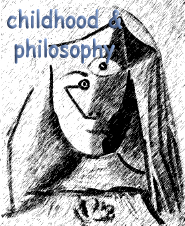the philosophical baby and socratic orality
DOI:
https://doi.org/10.12957/childphilo.2020.45963Keywords:
philosophy for children, philosophical practice, socratesAbstract
Lipman’s curriculum of “Philosophy for Children” was the outcome of a harmonious and fruitful partnership between philosophy and pedagogy, but over the time practice shows the risk of a double fall and reduction: on the one side into the ditch of pedagese and, on the other, into the ditch of philosofese. Using the expression “Philosophical Practice of Community” (PPC) instead of “Philosophy for children” (P4C) appears preferable to protect the latter from the risk of being considered, because of its evocative vagueness, both a sort of toy-philosophy, and a kind of pedagogical device suitable for all purposes. Set out in terms of PPC, the project of doing philosophy with children becomes part of a broader field of research concerning each of the three components (“philosophical”, “practice”, and “community”) and their relationships. If ideas are not clear about what “philosophical” means, the risk is that philosophy can be assimilated to other approaches and used as general as empty label. Among the many questions that a PPC puts on the table, I’ll try to frame three of them: 1) Is it necessary to know the philosophical tradition to practice philosophy with children? 2) Who are the philosophers? 3) How to revitalize the Socratic orality?
Downloads
References
Agamben G. (2001), La comunità che viene. Torino: Bollati Boringhieri;
Aristotle (1902), Poetics, 1447 B II. New York: Macmillan;
Bagnasco A. (1999), Tracce di comunità. Bologna: il Mulino;
Blanchot M. (1983) La communauté inavouable. Paris: de Minuit;
Bohm D. (2004), On Dialogue. New York: Routledge;
Bourdieu P. (1980), Le Sens Pratique. Paris: de Minuit;
Cassidy C. (2009), Thinking Children. The Concept of “Child” from a Philosophical Perspective. New York: Continuum;
Cosentino A. (2017), “Bambini filosofi”, Infanzia, N° 1/2017;
Cosentino A. (2017), “Il dialogo filosofico come strumento di ricerca”, Noema, n. 8-1/2017;
Cosentino A.-Oliverio S. (2011), Comunità di ricerca e formazione. Napoli: Liguori;
Dewey J. (1929), The sources of a science of education, The Later Works, Vol. 5 (1929-1930). Carbondale and Edwardsville: Southern Illinois University Press.
Dewey J. (1932), A Résumé of Four Lectures on Common Sense, Science and Philosophy, The Later Works, Vol. 6 (1931-1932), cit., pp. 424-433;
Dewey J. (1933), How We Think: A Restatement of the Relation of Reflective Thinking to the Educative Process, The Later Works, vol. 8, cit.;
Dewey J. (1938), Logic: The Theory of Inquiry, The Later Works, vol. 12, cit.;
Dewey J. (1939), Theory of Valuation, The Later Works, Vol. 13, cit. pp. 189-252;
Laërtius D. (2013), Lives of Eminent Philosophers. Cambridge: Cambridge University Press;
Esposito R. (1998), Communitas. Torino: Einaudi;
Fabbrichesi R. (2017), Cosa si fa quando si fa filosofia? Milano: Cortina.
Galimberti U. (2019), 100 storie di filosofi e ragazzi curiosi, Milano: Feltrinelli.
Gherardi S. (2000), “La pratica quale concetto fondante di un rinnovamento nello studio dell’apprendimento organizzativo”, Studi Organizzativi, N° 1, 2000;
Gopnik A. (2010), The Philosophical Baby: What Children’s Minds Tell Us About Truth, Love, and the Meaning of Life. New York: Picador;
Havelock E. A. (1963), Preface to Plato. Cambridge: Harvard University Press;
Haynes, J. (2002), Children as Philosophers. Learning through Enquiry and Dialogue in the Primary Classroom. London and New York: Routledge;
Kennedy D.- Brock B. (2017) Eds., Philosophy of Childhood Today: Exploring the Boundaries. New York: Lexington Books;
Kennedy, D. (2006), Changing Conceptions of the Child from the Renaissance to Post-Modernity. A Philosophy of Childhood. Lewiston-Queenston-Lampeter: The Edwin Mellen Press;
Kohan W. (2017), Childhood, Education and Philosophy. London-New York: Routledge;
Kohan, W.O. (2006), Infanzia e filosofia. Perugia: Morlacchi;
Lave J.-Wenger E. (1991), Situated Learning. Legitimate Peripheral Participation. Cambridge: Cambridge University Press;
Lipman M. (1991), Thinking in education. Cambridge: Cambridge University Press;
Marx K. (1845), “Theses on Feuerbach”, Marx-Engels The German Ideology. New York: Prometheus Books 1998;
McMillan D. W.-Chavis D. M. (1986), “Sense of Community: A definition and Theory”, Journal of Community Psychology, Vol. 14/1986, pp. 6-23;
Moore G. E. (1924), “A Defence of Common Sense”, Contemporary British Philosophy, Personal Statement, II/1924, pp. 193 sgg.;
Nancy J-L. (1986), La communauté désouvrée. Paris: Bourgois;
Oliverio S. (2014), “Un’epistemologia child-centred per una nuova cosmopoli. Note di filosofia dell’infanzia”, MeTis, Anno IV-N° 2, 12/2014;
Olson D.R.-Torrance N. (1991), Eds., Literacy and Orality. Cambridge: Cambridge University Press;
Peirce C. S. (1877), The Fixation of Belief, Collected Papers, 5.358. Cambridge (NJ): Harvard University Press 1931-1935;
Peirce Ch. S. (1905), Issues of Pragmaticism, Collected Papers, 5.438 sgg., cit.;
Plato (1888), Republic, 539b. Oxford: Claredon Press;
Plato (2008), The Symposium, 204, (edited by Howatson M. C.). Cambridge: Cambridge University Press;
Polanyi M. (1966), The Tacit Dimension. New York: Doubleday;
Reid Th. (1764), An Inquiry into the Human Mind, on the Principles of Common Sense. Edinburgh: Edinburgh University Press;
Risiew P. (2017), “Judgement and Practice in Reid and Wittgenstein”, European Journal of Pragmatism and American Philosophy, IX-2/2017;
Rorty R. (1979), Philosophy and the Mirror of Nature. Princeton: Princeton University Press.
Schülter C.-Clausen L. (1990), hrsg., Renaissance der Gemeinschaft? Stabile Theorie und neue Theoreme. Berlin: Duncker & Humblot;
Serra M. (2016), “Verso una concezione agonistica del dialogo: una prospettiva neo-sofistica”, Teoria, XXXVI/2016/1, pp. 7-24;
Sloterdijk P. (2010), Scheintod im Denken. Von Philosophie und Wissenschaft als Übung. Berlin: Suhrkamp;
Tassinari S. (2019), Il filosofo che c’è in te. I superpoteri della filosofia nella vita quotidiana. Milano: Feltrinelli;
Tönnies F. (1887), Gemeinschaft und Gesellschaft. Leipzig: Reisland;
Trabattoni F. (2012), “Dialogo”, D’Angelo P. (Ed.), Forme letterarie della filosofia, Roma: Carocci;
Vlastos G. (1991), Socrates, Ironist and Moral Philosopher. Ithaca: Cornell University Press;
Wenger E. (1998), Communities of Practice, Learning, Meaning and Identity. Cambridge: Cambridge University Press;
Yankelovich D. (2001), The magic of Dialogue. New York: Touchstone.




